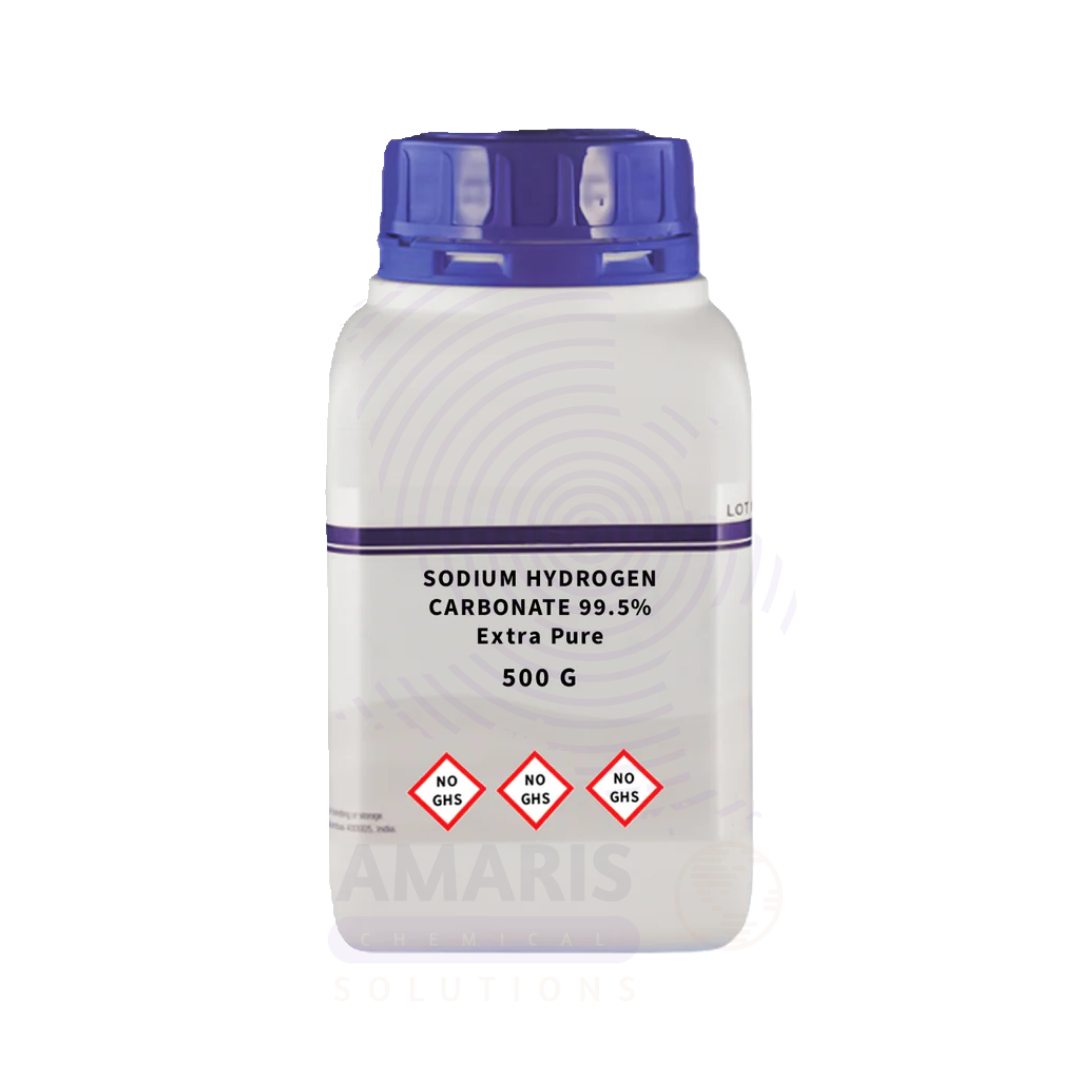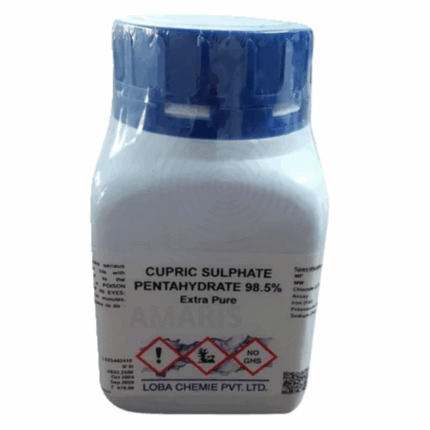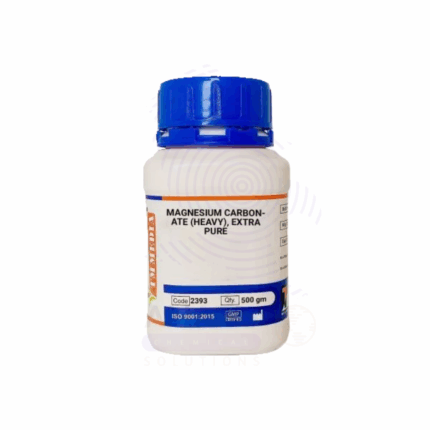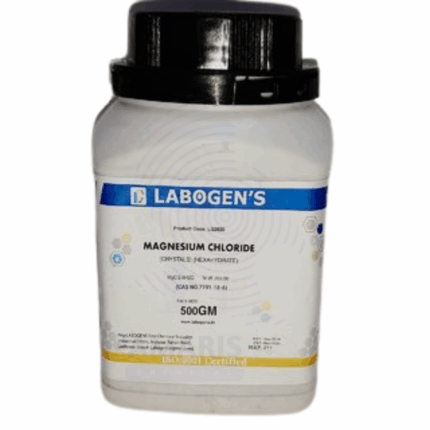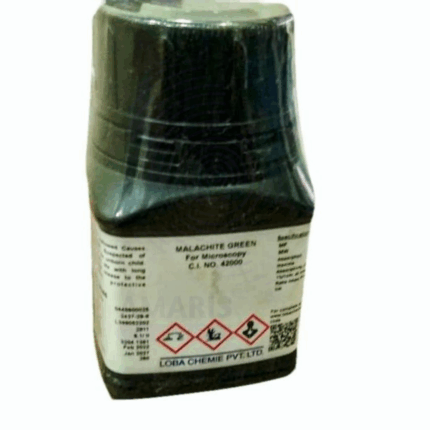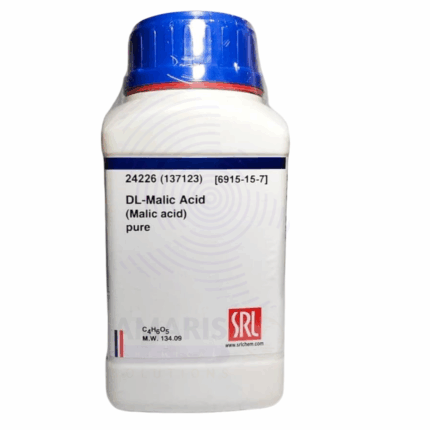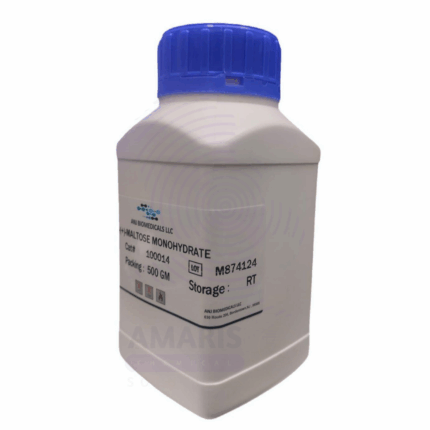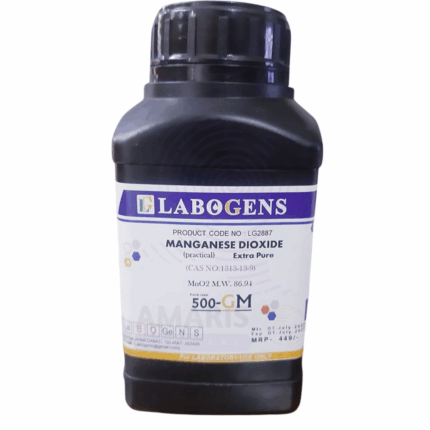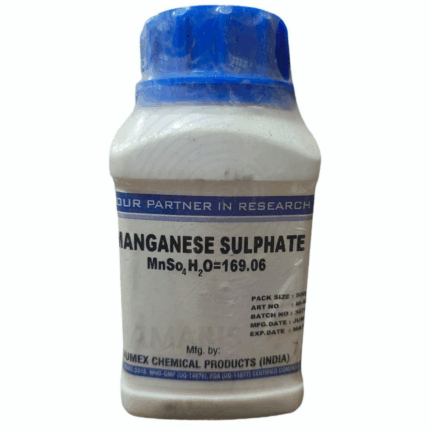
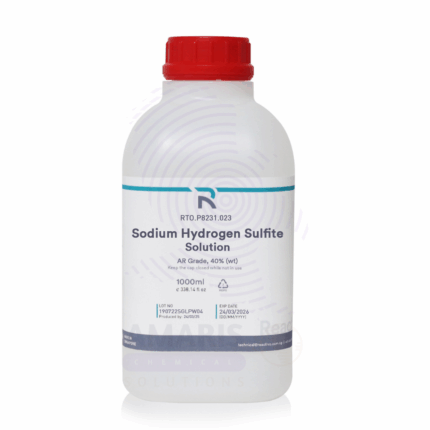
Sodium Hydrogen Carbonate Extra Pure
$ 18.00 Original price was: $ 18.00.$ 17.65Current price is: $ 17.65.
Sodium Hydrogen Carbonate Extra Pure, commonly known as baking soda, is a white, odorless, water-soluble crystalline powder with the formula NaHCO₃. It is widely used in laboratory and industrial settings as a mild alkaline reagent and buffering agent. In the food industry, it serves as a leavening and acidity regulator agent, while in pharmaceuticals, it is used for antacid formulations. Its ability to neutralize acids and release carbon dioxide under heat makes it valuable in baking, water treatment, and cleaning applications. The Extra Pure grade guarantees high purity and suitability for analytical, pharmaceutical, and food-grade uses. It should be stored in dry, sealed containers to maintain quality and prevent caking.
Sodium Hydrogen Carbonate Extra Pure
PRIMARY USES
Analytical Reagent & Laboratory Applications:
• Used as a primary standard and buffering agent in acid-base titrations
• Employed to maintain pH balance in biochemical and chemical experiments
• Acts as a mild alkaline reagent in laboratory processes
Food Industry:
• Widely used as a leavening agent (E500) in baking and food preparation
• Serves as an acidity regulator and anti-caking agent in food products
• Helps maintain freshness and texture in baked goods
Pharmaceutical & Cosmetic Industry:
• Used in antacid formulations to relieve indigestion and heartburn
• Incorporated in personal care products for pH adjustment and mild cleansing
Cleaning & Detergent Industry:
• Functions as a mild abrasive and deodorizer in household and industrial cleaners
• Helps neutralize acidic residues and odors
Water Treatment:
• Used to adjust pH and soften water by neutralizing acidity
SECONDARY USES
Fire Suppression:
• Acts as a component in some dry chemical fire extinguishers for small fires
Agricultural Applications:
• Utilized to neutralize acidic soils and improve crop growth conditions
-
Basic Identification Attributes
• Chemical Name: Sodium Hydrogen Carbonate
• CAS Number: 144-55-8
• HS Code: 2836.20.00
• Molecular Formula: NaHCO₃
• Synonyms:
- Baking soda
- Sodium bicarbonate
- Bicarbonate of soda
-
Physical & Chemical Properties
Physical State: Solid (fine powder or crystalline)
• Color & Odor: White, odorless
• Melting Point: Decomposes at about 270 °C releasing CO₂
• Density: Approximately 2.20 g/cm³
• Solubility:
- Soluble in water (~96 g/L at 20 °C)
- Insoluble in ethanol
• pH Level: Mildly alkaline (pH ~8.3 in aqueous solution)
• Vapor Pressure: Negligible
• Flash Point: Not applicable (non-flammable)
-
Safety & Hazard Attributes
Hazard Class (GHS Classification):
- Generally regarded as safe; may cause mild irritation if inhaled in large amounts
• NFPA Ratings: - Health: 1
- Flammability: 0
- Reactivity: 0
• Exposure Limits: - No specific OSHA PEL or ACGIH TLV established
• Reactivity: - Stable under normal conditions
- Decomposes on heating releasing CO₂
-
Storage & Handling Attributes
Storage Conditions:
- Store in a dry, cool, well-ventilated place
- Keep container tightly closed to prevent moisture absorption
• Incompatible Materials: - Strong acids (react to release CO₂)
- Moisture (causes clumping)
• Container Type: - Plastic or sealed metal containers
• Shelf Life: - Stable for several years if kept dry
• Special Handling Requirements: - Avoid dust formation
- Use protective gloves and eye protection when handling large quantities
-
Regulatory & Compliance Attributes
Regulatory Status:
- Approved food additive (E500)
- Listed under REACH, FDA, and EPA regulations
• Transportation Restrictions: - Not classified as hazardous for transport
• Waste Disposal Method: - Dispose according to local regulations; non-hazardous waste
-
Environmental & Health Impact
Ecotoxicity:
- Low toxicity to aquatic organisms
• Persistence in Environment: - Readily dissolves and neutralizes acidic components in water
• Carcinogenicity/Mutagenicity: - Not classified as carcinogenic or mutagenic
• Biodegradability:
- Inorganic; not biodegradable but environmentally benign
SAFETY PRECAUTIONS
Personal Protective Equipment (PPE):
• Wear gloves to prevent prolonged skin contact
• Use safety goggles to avoid eye irritation
• Use dust mask if handling in dusty environments
Handling:
• Avoid inhalation of dust
• Handle in well-ventilated areas
• Wash hands thoroughly after use
Storage:
• Store in sealed containers away from moisture and acids
• Keep in a cool, dry place
FIRST AID MEASURES
Inhalation:
• Move affected person to fresh air
• Seek medical attention if breathing difficulties occur
Skin Contact:
• Wash with soap and water
• Remove contaminated clothing
• Seek medical advice if irritation develops
Eye Contact:
• Rinse immediately with plenty of water for at least 15 minutes
• Seek medical attention if irritation persists
Ingestion:
• Rinse mouth with water
• Seek medical advice if large amounts ingested or symptoms occur
FIRE FIGHTING MEASURES
Flammability:
• Non-flammable
Extinguishing Media:
• Use water spray, foam, dry chemical, or CO₂
Hazardous Combustion Products:
• Releases carbon dioxide upon decomposition
Firefighter Protection:
• Wear standard protective equipment including self-contained breathing apparatus if needed


 Acidulants
Acidulants Antioxidants
Antioxidants Nutraceutical Ingredients (food)
Nutraceutical Ingredients (food)
 Collectors
Collectors Dust Suppressants
Dust Suppressants Explosives and Blasting Agents
Explosives and Blasting Agents Flocculants and Coagulants
Flocculants and Coagulants Frothers
Frothers Leaching Agents
Leaching Agents pH Modifiers
pH Modifiers Precious Metal Extraction Agents
Precious Metal Extraction Agents
 Antioxidants(plastic)
Antioxidants(plastic) Colorants (Pigments, Dyes)
Colorants (Pigments, Dyes) Fillers and Reinforcements
Fillers and Reinforcements Flame Retardants
Flame Retardants Monomers
Monomers Plasticizers
Plasticizers Polymerization Initiators
Polymerization Initiators Stabilizers (UV, Heat)
Stabilizers (UV, Heat)
 Antifoaming Agents
Antifoaming Agents Chelating Agents
Chelating Agents Coagulants and Flocculants
Coagulants and Flocculants Corrosion Inhibitors
Corrosion Inhibitors Disinfectants and Biocides
Disinfectants and Biocides Oxidizing Agents
Oxidizing Agents pH Adjusters
pH Adjusters Scale Inhibitors( water)
Scale Inhibitors( water)
 Antioxidants(cosmetic)
Antioxidants(cosmetic) Emollients
Emollients Fragrances and Essential Oils
Fragrances and Essential Oils Humectants
Humectants Preservatives
Preservatives Surfactants(cosmetic)
Surfactants(cosmetic) Thickeners
Thickeners UV Filters
UV Filters
 Fertilizers
Fertilizers Soil Conditioners
Soil Conditioners Plant Growth Regulators
Plant Growth Regulators Animal Feed Additives
Animal Feed Additives Biostimulants
Biostimulants Pesticides (Herbicides, Insecticides, Fungicides)
Pesticides (Herbicides, Insecticides, Fungicides)
 Active Pharmaceutical Ingredients (APIs)
Active Pharmaceutical Ingredients (APIs) Excipients
Excipients Solvents(pharmaceutical)
Solvents(pharmaceutical) Antibiotics
Antibiotics Antiseptics and Disinfectants
Antiseptics and Disinfectants Vaccine Adjuvants
Vaccine Adjuvants Nutraceutical Ingredients (pharmaceutical)
Nutraceutical Ingredients (pharmaceutical) Analgesics & Antipyretics
Analgesics & Antipyretics
 Analytical Reagents
Analytical Reagents Chromatography Chemicals
Chromatography Chemicals Spectroscopy Reagents
Spectroscopy Reagents Molecular Biology Reagents
Molecular Biology Reagents Biochemical Reagents
Biochemical Reagents Inorganic and Organic Standards
Inorganic and Organic Standards Laboratory Safety Chemicals
Laboratory Safety Chemicals Specialty Laboratory Chemicals(Special Laboratory Equipment)
Specialty Laboratory Chemicals(Special Laboratory Equipment)
 Demulsifiers
Demulsifiers Hydraulic Fracturing Fluids
Hydraulic Fracturing Fluids Scale Inhibitors(oil)
Scale Inhibitors(oil) Surfactants(oil)
Surfactants(oil) Drilling Fluids
Drilling Fluids
 Dyes and Pigments
Dyes and Pigments Bleaching Agents
Bleaching Agents Softening Agents
Softening Agents Finishing Agents
Finishing Agents Antistatic Agents
Antistatic Agents
 Admixtures
Admixtures Waterproofing Agents
Waterproofing Agents Sealants and Adhesives
Sealants and Adhesives Curing Compounds
Curing Compounds Concrete Repair Chemicals
Concrete Repair Chemicals Anti-Corrosion Coatings
Anti-Corrosion Coatings
 Surfactants(cleaning)
Surfactants(cleaning) Builders
Builders Enzymes
Enzymes Solvents (Cleaning)
Solvents (Cleaning) Fragrances
Fragrances
 Electronic Chemicals
Electronic Chemicals Catalysts
Catalysts Lubricants
Lubricants Photographic Chemicals
Photographic Chemicals Refrigerants
Refrigerants Automotive chemicals
Automotive chemicals Pyrotechnic Chemicals
Pyrotechnic Chemicals
 Biodegradable Surfactants
Biodegradable Surfactants Bio-based Solvents
Bio-based Solvents Renewable Polymers
Renewable Polymers Carbon Capture Chemicals
Carbon Capture Chemicals Wastewater Treatment Chemicals
Wastewater Treatment Chemicals
 Pigments
Pigments Solvents(paint)
Solvents(paint) Specialty Coatings
Specialty Coatings Binders/Resins
Binders/Resins Additives
Additives Driers
Driers Anti-Corrosion Agents
Anti-Corrosion Agents Functional Coatings
Functional Coatings Application-Specific Coatings
Application-Specific Coatings
 Fresh Herbs
Fresh Herbs Ground Spices
Ground Spices Whole Spices
Whole Spices Spice Blends
Spice Blends Dried Herbs
Dried Herbs
 Leavening Agents
Leavening Agents Dough Conditioners
Dough Conditioners Flour Treatments
Flour Treatments Fat Replacers
Fat Replacers Decoratives
Decoratives Preservatives(baking)
Preservatives(baking)
 Plasticizers & Softeners
Plasticizers & Softeners Reinforcing Agents
Reinforcing Agents Adhesion Promoters
Adhesion Promoters Vulcanizing Agents
Vulcanizing Agents Antidegradants
Antidegradants Blowing Agents
Blowing Agents Fillers & Extenders
Fillers & Extenders Accelerators & Retarders
Accelerators & Retarders